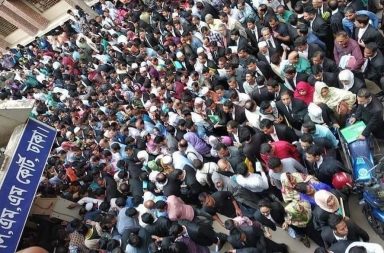By Aiman Rahman Khan
The main law that governs rape as an offense in Bangladesh, the Penal Code 1860, finds sexual intercourse with wife without her consent, to be legal. Ridiculous as it may sound, this Act didn’t bat an eyelid on this heinous offense that occurs behind closed doors. Marital rape can happen in any relationship. Where there is domestic violence, there is always the possibility of marital rape. This is a form of domestic violence and women are afraid to speak out or are too embarrassed to speak out. The consequences are the same as rape between people who are not married. These wives suffer from depression, post traumatic stress disorder (PTSD), loss of trust, shock, anxiety and intense fear.[1] Even though it happened between a man and his wife, rape is rape. In a world full of misogynists, the screams of the oppressed is forcibly silenced in the dead of the night.
Rape is considered to be the highest form of atrocity and a gross violation of human rights. It is an unjustifiable act of a debased personality which has been lowered to the depth of filth. It knows no race, no religion but is a virus that corrupts the mind permanently. “ It’s a forceful act that seizes ones control over their own body, and renders them powerless; in such a way that is more extreme than being beaten with a belt. Because of this, rape is an act that is humiliating and psychologically crushing for the victim”[2]
Marital Rape involves prolonged psychological abuse which is merely reported in Bangladesh. But according to a recent nationwide survey conducted by the Bangladesh Bureau of Statistics in collaboration with the United Nations Population Fund, nearly nine out of 10 husbands abuse their wives in Bangladesh, The survey titled “Violence Against Women Survey 2011” conducted on 12,600 women randomly chosen across the seven divisions says an astonishing 87 percent of married women are abused by their husbands.[3]
“In countries where marital rape is not considered a crime, under the cloak of marriage, a husband enjoys state-sanctioned rights to access his wife’s body on the grounds of his right sexual fulfillment within marriage.”
–Dianne Richardson (Rethinking Sexuality, 2000)
In Bangladeshi households, it is disrespectful for a wife to deny sex to her husband. Given the conventional mindset and religious superstition, it becomes a duty for the wife to fulfill her husband’s unreasonable physical needs. This results in the husband demanding sexual intercourse even without her consent. While on the attempts to save the marriage, she never restrains. Incidents like these have been going on for centuries and no one in this part of the world found it unnatural. Life remains the same for the wife, making breakfast for the husband the next day, doing her chores, taking care of the children. But what truly changes is her level of eagerness to be happy, her well being and most importantly her inner peace. She won’t utter a word, fearing that it might hurt her loving husband’s feelings. She has vowed to take care of him on her wedding day.
She has been taken control of and molded by her in laws to fit right in, making her a robot in denial mode. Hence, such injustice done to her is anything but a crime, in her controlled eyes. It is that offense which never gets reported and the criminal roams around freely waiting to repeat his actions in the night that follows.
Unless the marital rape results in the wife succumbing to injuries, the story never steps out of the four walled room. It is therefore a crime that occurs every day, every month of the year and yet remains unknown to the outside world. According to Bangladesh National Woman Lawyers’ Association (BNWLA) statistics, at least 241 rape incidents were reported between January and May 23, 2015. The organization said the incidence of rape has been rising since 2010. BNWLA statistics showed 789 rapes reported in 2014, 719 in 2013, 836 in 2012, 603 in 2011 and 411 in 2010.[4]
Just two decades earlier, the House of Lords delivered a landmark judgment[5] that under English law, it is possible for a husband to rape his wife. Similarly, since 1993, the US had made it illegal in all of its states. While most countries in the world declared marital rape illegal, we Bangladeshi lawyers take a deep breath while reading the exception of Section 375, Penal Code 1860. “Sexual intercourse by a man with his own wife, the wife not being under thirteen years of age, is not rape.”
Neither Section 9 of the Women and Children Repression Prevention Act, 2000 nor Nari-O-Shishu Nirjatan Domon Ain 2003 says nothing about the legality of marital rape! The 2000 Act states that whoever, to satisfy his sexual urge illegally, assaults a woman sexually or makes any indecent gesture, his act shall be deemed to be sexual oppression and he shall be punished with imprisonment for either description which may extend to seven years but not less than two years of rigorous imprisonment and also with fine.[6]
However the Paribarik Shohingshota (Protirodh-O-Shurokkha) Ain, 2010 merely swerves past the topic by mentioning violence that affects the wife’s status and honor. It is highly unfortunate for a country which enacted three statutes in the recent past to not have amended a 156 year old Act. Since the concept of ‘marital rape’ does not exist legally, it is assumed a woman cannot be raped by her husband since the ‘crime’ of rape is legally defined as forced sexual intercourse on someone other than the wife of the person accused. It is clear that if a man forcibly enjoys sexual intercourse with his wife, it should fall under marital rape.[7]
Our concern is deep rooted and how the law might assist in preventing, if not, uprooting this crime. The fear of social stigma and conjugal disintegration makes most victims remain silent while many fall short of patience and courage to hold on to life. Then there are few who rise against such injustice. The ones, who do so, also fall in the vicious pit of shaming in the community. They get marked as bad omen for failing to secure their marriage. Their only hope is the NGOs that are working consistently in acting as their shield. Through them, the few reported cases have received the highlight.
What time demands is a formal amendment of the Penal Code or introducing a new Act regarding prevention of rape. A new Act that focuses solely on the various forms of rape and punishments would be sufficient to cover Marital Rape. It shall cover the signs, initial stages and what to do when faced with a situation and what the law offers a wife regarding this. An Anti Rape Act would require a speedy and confidential trial facility, as well as ensuring maximum penalty for the offender. It would have a retrospective effect with the option of divorce if the crime continued for more than 10 days prior to the date of the complaint. It will also provide exceptions, which would state how a common marital row differs from rape. The Act shall limit the crime only to penetration in marriage, but abusing that relates to torture of the private parts. Other physical abuse shall also be included and provided respective penalties.
An Anti Rape Act would only see the face of reality if there is a massive cooperation among the pressure groups. An ambitious request such as this is however subject to criticisms. If a detailed discussion is taken place at a ministerial level, there is a strand of hope that it will be enacted someday. The workability of it depends on the law enforcers and due process. Such an Act would not only punish the offenders but create a wide spread awareness about the consequences of their actions. The oppressed women would find their haven and start to speak without fear of humiliation. Only then can the silence become audible.
Aiman Rahman Khan is currently pursuing his Master of Social Science with a major in Victimology and Restorative Justice from University of Dhaka.. He completed his LLB from University of London and LL.M from Eastern University, Bangladesh.
Reference
[1] Vanguard, ‘Can a husband rape his wife?’ [http://www.vanguardngr.com/2016/04/can-husband-rape-wife/]
[2] Nicholson A, comment on a blog titled ‘Why is Rape wrong’ on Quora Website (2011), (https://www.quora.com/Why-is-rape-wrong)
[3] Islam Z, ‘Most abused at homes’, The Daily Star (2015), [www.loc.gov/law/foreign-news/article/india-criminal-law-amendment-bill-on-rape-adopted/]
[4] Hasan K, Khan Jamil M, ‘Rape, Rape-murder Rising’, The Dhaka Tribune (2015). [http://archive.dhakatribune.com/crime/2015/may/31/rape-rape-murder-rising]
[5] R v R [1991] UKHL 12
[6] Harv. Sch. of Pub. Health, supra note 7, at 4. (http://www.hsph.harvard.edu/population/trafficking/bangladesh.traf.00.pdf)
[7] Shuvo A, ‘Marital Rape: Let’s make some noise!’, The Opinion Pages (Bdnews24.com), (2015), [http://opinion.bdnews24.com/2015/04/19/marital-rape-let%E2%80%99s-make-some-noise/]



